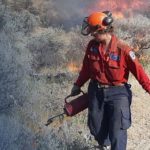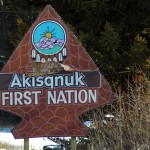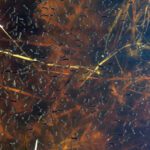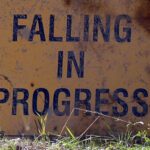Home »

Invasive mussel fight gets reinforcements
Three additional invasive mussel mobile inspection and decontamination crews will be added to the Columbia Basin following a funding announcement this morning (July 10) at Moyie Lake Provincial Park.
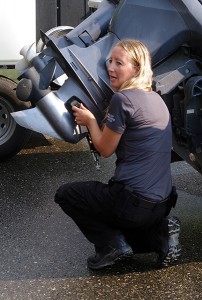
The Columbia Basin Trust is helping the province to double the number of mobile decontamination units aimed at stopping invasive mussels from entering British Columbia waterways, thanks to $360,000 in new funding.
The new teams join three other crews that are already operational, doubling the number of mobile units dedicated to protecting B.C.’s lakes and rivers against the threat of quagga and zebra mussels.
Aquatic invasive species, such as zebra and quagga mussels, pose a significant threat to Canada’s freshwater ecosystems and critical infrastructure such as hydroelectric and drinking water facilities.
No zebra or quagga mussels have ever been found in B.C. waterways, and the province is hard at work ensuring it stays that way.
The decontamination units allow auxiliary conservation officers, who are trained to identify mussel-infested boats, to decontaminate boats and trailers entering B.C. The teams also respond to boats identified as concerns by the Canada Border Services Agency, and partner agencies in Alberta and the U.S.
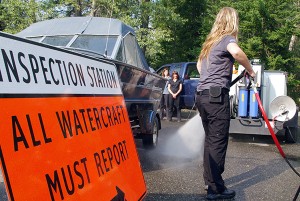 The mobile units move between border locations, focusing on high-traffic routes and have the ability to quickly respond to any reports of potential threats called in through the provincial Report All Poachers and Polluters line.
The mobile units move between border locations, focusing on high-traffic routes and have the ability to quickly respond to any reports of potential threats called in through the provincial Report All Poachers and Polluters line.
The addition of these specialized mussel detection teams further enhances the provincial early detection and rapid response program for invasive mussels. This includes supporting education and outreach activities, such as the “Clean, Drain, Dry” program being delivered by the invasive species councils.
The new resources mean an additional three mobile inspection and decontamination crews will be dedicated to stopping and ensuring boats are free of mussels. The teams will be based in Cranbrook, Valemount and Nelson, to target major entry points from Alberta and the U.S.
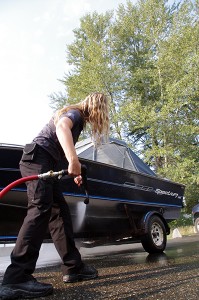 The traveling boating public has been receptive and positive to having to stop at boat wash stations, said Ember Heidt, Compliance and Enforcement Officer – Crew Leader with the Conservation Officer Service, as she demonstrated how an inspection and boat wash is done for a host of dignitaries taking in the morning’s announcement.
The traveling boating public has been receptive and positive to having to stop at boat wash stations, said Ember Heidt, Compliance and Enforcement Officer – Crew Leader with the Conservation Officer Service, as she demonstrated how an inspection and boat wash is done for a host of dignitaries taking in the morning’s announcement.
Thus far, about 500 boats have been checked so far this summer – and that includes canoes and kayaks, Heidt said. “The risk is less but it is still positive,” she said of the self-propelled smaller craft.
Along with boats being thoroughly checked, as well as motors and props, inspectors check boat trailers and even life jackets, Heidt said.
“Anything that comes in contact with the water (if they are infected with quagga and zebra mussels). It can just happen in a moment,” she explained, adding B.C. is so far lucky that it has “buffers” from jurisdictions that have been infected with invasive mussels. So far Alberta, Montana, Idaho and Washington are mussel-free. However, the rate at which the mussels have spread from the eastern half of the continent means continued and complete diligence from all states and provinces, said said.
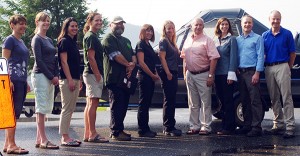 The Ministry of Environment led Invasive Mussel Defence Program includes support from Columbia Power Corporation, FortisBC and the four local invasive species councils operating in the region and beyond, including the East Kootenay Invasive Plant Council, Central Kootenay Invasive Species Society, Columbia Shuswap Invasive Species Society and the Northwest Invasive Plant Council, with most being represented at this morning’s announcement.
The Ministry of Environment led Invasive Mussel Defence Program includes support from Columbia Power Corporation, FortisBC and the four local invasive species councils operating in the region and beyond, including the East Kootenay Invasive Plant Council, Central Kootenay Invasive Species Society, Columbia Shuswap Invasive Species Society and the Northwest Invasive Plant Council, with most being represented at this morning’s announcement.
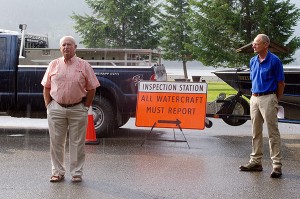
“Invasive mussels pose a threat to more than just ecosystems, but to drinking water facilities, hydro stations, agricultural irrigation and more. This funding boost from Columbia Basin Trust, Columbia Power Corporation and FortisBC allows the Province to further strengthen efforts to stop zebra and quagga mussels from entering B.C.,” stated Kootenay East MLA Bill Bennett.
Neil Muth, president and CEO of Columbia Basin Trust said, “Preventing the threat of invasive mussels is critical to protecting our waterways for environmental, economic and recreational reasons, and has been identified as a priority by the residents that live here. Increasing the level of protection in this region is key and we are pleased to support the prevention efforts this summer to keep mussels out of the Columbia Basin.”
“Protecting aquatic infrastructure and the environment is important to Columbia Power. We are pleased to be working in partnership with the Ministry of Environment and Columbia Basin Trust to generate awareness of invasive mussels and create new decontamination sites,” added Sue Dyer, vice president, Operations, Columbia Power Corporation.
 Zebra mussels (Dreissena polymorpha) and quagga mussels (Dreissena rostriformis bugensis) are not native to B.C. Both of these species originate from Europe. They were introduced to Canada (in the Great Lakes region) and the United States in the 1980s, as the result of ballast water being discharged by vessels travelling from Europe.
Zebra mussels (Dreissena polymorpha) and quagga mussels (Dreissena rostriformis bugensis) are not native to B.C. Both of these species originate from Europe. They were introduced to Canada (in the Great Lakes region) and the United States in the 1980s, as the result of ballast water being discharged by vessels travelling from Europe.
They are propeller blade shaped freshwater mussels that can easily attach themselves to objects and other organisms, and they are difficult to remove.
Adult mussels will attach themselves to boat hulls, trailers, motors, vegetation and equipment.
Where introduced, these mussels kill native mussels and clams, and reduce native fish species, by altering the aquatic food web. They also attach to aquatic plants and submerged surfaces, including piers, pilings, water intakes and fish screens.
If large numbers of mussels become established in an area, they can cover hard surfaces and clog pipes.
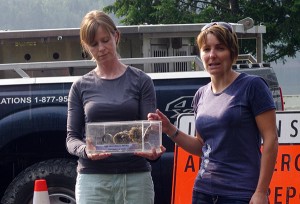 “Preventing the introduction of zebra and quagga mussels is key because it only takes one boat with live mussels or their larvae to enter a waterway in B.C. to be catastrophic. This is why it’s so important that this defence program continue beyond this summer and that it continues to expand here in the Columbia Basin and throughout the province,” said Khaylish Fraser, aquatic invasive species program coordinator with the Central Kootenay Invasive Species Society.
“Preventing the introduction of zebra and quagga mussels is key because it only takes one boat with live mussels or their larvae to enter a waterway in B.C. to be catastrophic. This is why it’s so important that this defence program continue beyond this summer and that it continues to expand here in the Columbia Basin and throughout the province,” said Khaylish Fraser, aquatic invasive species program coordinator with the Central Kootenay Invasive Species Society.
Funding for this initiative is provided as follows: Columbia Basin Trust – $275,000; Columbia Power Corporation – $70,000; and FortisBC – $15,000.
Columbia Basin Trust entered into a three-year partnership with the four invasive species councils (councils) in the Basin last year. The councils have recently completed the development of a coordinated Basin-wide strategy for addressing priority aquatic invasive species, including mussels.
To report suspected invasive mussels, please call the Report All Poachers and Polluters line (RAPP), at 1-877-952-7277.
Find out more about invasive zebra and quagga mussels click HERE.
To find out more about what the public can do to help keep B.C. invasive-mussel free, visit HERE.
Lead image: Ember Heidt, Compliance and Enforcement Officer – Crew Leader with the Conservation Officer Service shows how the boat wash station works to Kootenay East MLA Bill Bennett and a host of dignitaries, including members of the Ministry of Environment led Invasive Mussel Defence Program. Ian Cobb/e-KNOW photos
e-KNOW

